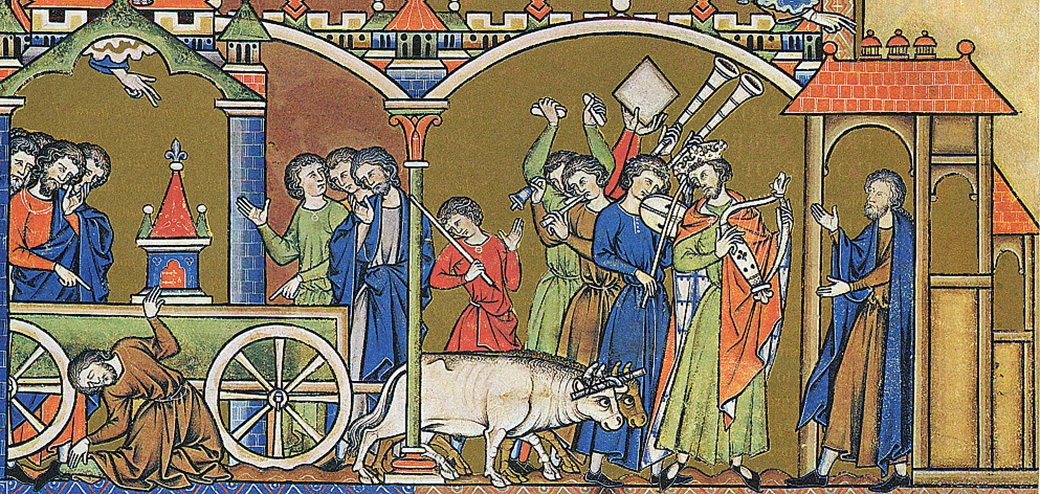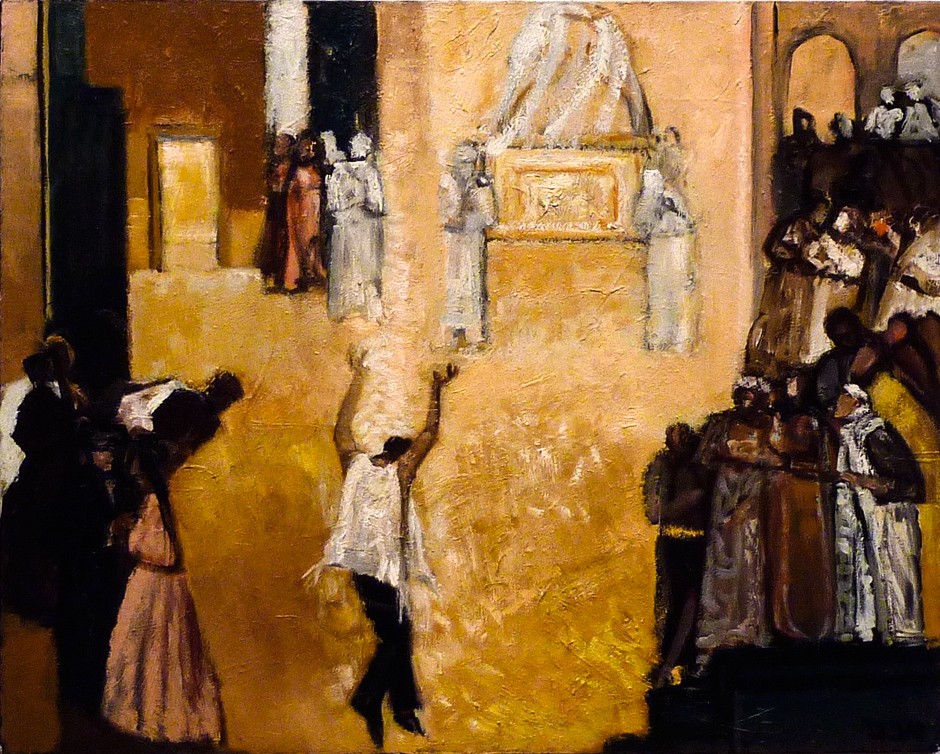The 4th Sunday of Advent: 2 Samuel 7:1-5, 8b-12, 14a, 16, Luke 1:26-38.
Today we are asked to witness the scope of God’s plan through the generations as He prepares a home for Himself in humanity. Can there be a better reminder that we owe all we have to God than today’s readings? He grants a Chosen People laws to live by, prophesy to announce His plans, leaders to shepherd them, and, when they’re ready, a living home for Himself: the Virgin Mary.

I’ve always considered King David’s desire to build God a house a very reasonable and respectful one. As he concisely puts it in today’s reading, “Here I am living in a house of cedar, while the ark of God dwells in a tent!” At some point, many of us have a moment when we count our blessings and wonder if we’ve been thankful enough to God. David was pretty respectful throughout his life, but this seems like one of those moments. I can imagine him sitting on his throne in a splendid new palace in Jerusalem, surveying the finery and feeling a cold ripple of guilt ripple from his scalp down to his tailbone. We read that he was King in Hebron for 7 years before taking back Jerusalem from the Jebusites, setting up there, and calling it the City of David. He reigned there for 33 years, and “In Jerusalem, after he came from Hebron, David took more concubines and wives; and more sons and daughters were born to David” (2 Sam 5:13). But then he has this moment, something is nagging him, God seems to be calling to him. In his kingly surety, he takes 30,000 men in a festive atmosphere to go get the Ark of the Covenant where it had been housed for 20 years (the house of Abinadab) about 7 miles west of Jerusalem. David’s ecstatic: he’s purchased a new cart for the ark and they’re leading it away in great rejoicing, “David and all the house of Israel were dancing before the Lord with all their might, with songs and lyres and harps and tambourines and castanets and cymbals” (2 Sam 6:5). Personally, I love the translation of “dancing with all their might” — it conjures quite a picture!
But something goes wrong. They only make it partway back because as they pass through a threshing floor, the oxen make the cart sway and Uzziah (Abinadab’s son who was helping transfer the ark) uses his hand to steady the ark — touching the Ark of the Covenant is strictly forbidden — and he drops dead instantly. “David was afraid of the Lord that day” (2 Sam 6:9), and abandons his great plan, leaving the ark at the “house of Obed-edom.” The great king, who gathered his great throng of people for this royal procession was mortified, upset, and even a bit angry.

What’s going on here? Why does this happen and why is it recorded in both 2 Samuel and 1 Chronicles? The full answer lies in today’s reading, but let’s consider what we’ve just covered. It’s no accident that Uzziah is struck dead as they pass over a threshing floor, a place of the harvest. The natural order of things is backward. We have an earthly king, even though he is favored and blessed by God, who goes out to “take” God into his city. The great pride of the king reaches a physical moment when Uzziah reaches out his human hand to “steady” the divine ark. This is not God’s plan for the natural order of things. Humans must approach the Lord in humility and be led by Him, not lead Him. What is being harvested here? God?! No, that cannot be; do we dare see our immense Creator as someone to be harvested and taken to fulfill our desires? King David got it wrong.
But God continued to call to David. He wants to establish himself with the nation of Israel, but He needs David to better understand their relationship and the great plan of salvation of which he is a part. David hears that the house of Obed-edom has been blessed by the Lord for the three months that the ark has rested there and he decides to go back to try again. This time, however, he approaches with much more reverence. This is most clearly manifested in the way the ark is handled, as David himself realizes: “the Lord our God burst out against us, because we did not give it proper care” (1 Chron 15:13b). David commands that only Levites should carry the ark (as prescribed back in Moses’s time) and set out with a large group of priests, making sacrifices and making loud music again, but this time of a much more religious ritual nature. He even wears a “linen ephod,” which is the ceremonial dress of priests. This time, they make it all the way back to Jerusalem amid great rejoicing. They place it inside the tent David has pitched for the ark, outside of his palace. David seems to be doing things right this time. While this next passage seems to be simply a description of more ritualistic practice, there’s more going on:
David offered burnt offerings and offerings of well-being before the Lord. When David had finished offering the burnt offerings and the offerings of well-being, he blessed the people in the name of the Lord of hosts, and distributed food among all the people, the whole multitude of Israel, both men and women, to each a cake of bread, a portion of meat, and a cake of raisins (2 Sam 6:17b-19).
Here we have the greatest commandment in action! You shall love the Lord your God with all your heart, and with all your soul, and with all your strength, and with all your mind; and your neighbor as yourself. God is guiding David to give us an example of loving Him and then loving your neighbors.

But it will take Christ to explain how this needs to be a transformation of heart and continuation of God’s love as expressed in charity, because David falls back into his prideful control mode again as we read in today’s reading. God speaks in a dream to David’s right-hand man, the prophet Nathan, telling him to respond to David’s desire to build a house with a reminder that God is the one in the process of building a home for the Chosen People, not the other way around. “Should you build me a house to dwell in? It was I who took you from the pasture … I will fix a place for my people Israel.” God then shares with Nathan a fabulous insight into his saving plan for humanity: “The LORD also reveals to you that he will establish a house for you. … I will raise up your heir after you, sprung from your loins, and I will make his kingdom firm. I will be a father to him, and he shall be a son to me.” There is so much here. First, God is re-fashioning the idea of a house to mean more than the hard-roofed dwelling that David has in mind. He expands this to mean a lineage, a heritage, but more than that: a type of life that extends beyond the one that David lives. This lineage, as we know, will bring forth the Son of God, so this is more than just living genetically through his line — it is the promise of a life in Christ’s Kingdom beyond the one David lives in now. That Kingdom, distinct from David’s kingdom, is the real “house” for David and all of humanity. This also carries with it the promise to convert the literal, ritualistic practice of the Time of Promises (David’s idea of a house) into a conversion of heart and life of love in the End Times (God’s idea of a house).
With an expanded notion of “house” in our minds, let’s turn to the gospel reading. This is Luke’s account of the Annunciation, about which I’ve already written extensively (see Our Blessed Kecharitōmenē). There is much to say about Mary’s perfect “yes” to the Lord, and if you’re craving a reflection on that, I’d suggest clicking on that post. For today, however, I’d like to follow this thread of the house for the Lord. God, being the omnipresent, omniscient Creator, has always had a great plan and logic for the universe that we’ll never comprehend until perhaps we achieve perfect union with Him. But we have a good window to His saving plan as it begins with Abraham and the Chosen People. And we just explored another milestone moment with King David. Fast forward 1,000 years and we have the gospel reading, but let’s not overlook those thousand years with the struggles of the Jewish people to understand the teachings of the Lord through their prophets, their territorial battles and exile to Babylon, and their return to Israel as a people more religious and dedicated to God. That time of formation made them the people they became: devout, expectant, forged in penance and reconciliation. Historians write that Jewish girls in Mary’s time were steeped in a tradition of the Torah and the prophets and knew that one of them, perhaps sometime soon, would become mother to the Messiah. Perhaps God’s plan in the Time of Promises was to create the culture, readiness, and parents who would produce the perfect “house” for Him to enter the world.
Gabriel, in all of his fearsome glory, appears to Mary and bestows a divine title, recognizing the blessings of God upon her: “Grace to you, The One Whom Grace Inhabits, The Lord is with you!” (as my reflection in the post referenced above explains). If you were graced with spiritual senses, Mary must have glowed like the sun. Gabriel’s blessed message is the great pivot point of God’s plan for humanity: “Behold, you will conceive in your womb and bear a son, and you shall name him Jesus. He will be great and will be called Son of the Most High, and the Lord God will give him the throne of David his father, and he will rule over the house of Jacob forever, and of his kingdom there will be no end.” Gabriel has fused the house of Jacob, throne of David, and Fatherhood of God into this statement. Our dogma about Christ being fully man and fully divine is based in this revelation. The house of God is now fused with the house of David in a way that David himself never could have accomplished. God told David not to build Him a house because God was building His own house, a living house in human flesh, something that David could never have conceived.

This living house is Mary’s womb. This is why Mary is the Ark of the New Covenant. She is so much more perfect than the tent that housed the Ark of the Covenant apart from humanity because she is the way that God finds a way to truly dwell within humanity.
Time is of no matter to God, Who exists inside and outside of time simultaneously. But to us, to humanity … well, let’s say that we’ve been waiting for this Living House of God since the earliest humans learned to grunt. And we wait for it for four weeks every Advent, a commemoration of the long Time of Promises where humanity lived in darkness, awaiting the Savior like the dawn.
Blessed are you, Mary, Kecharitōmenē! Blessed are we, as our God comes to live in us!